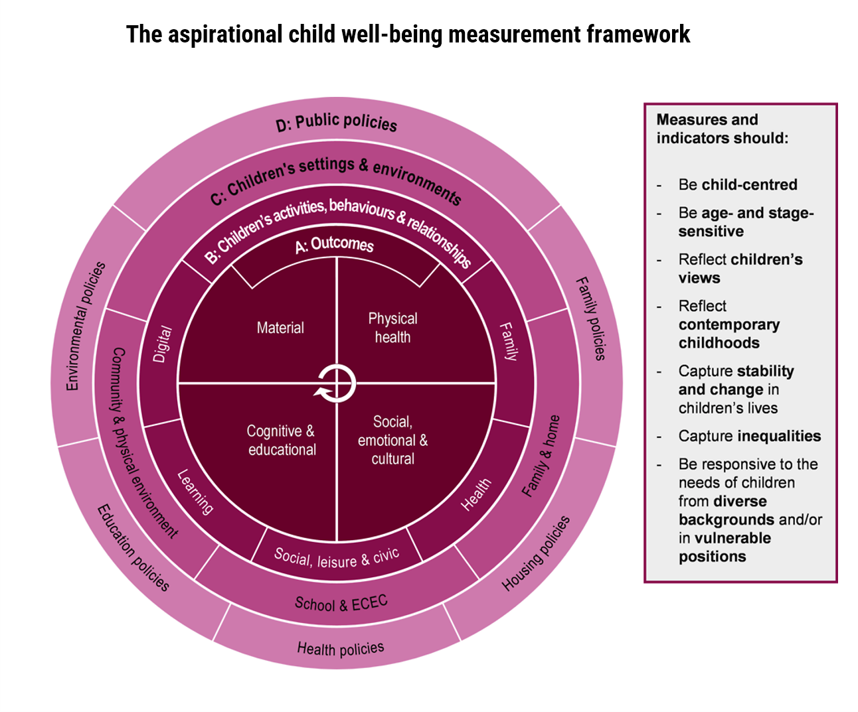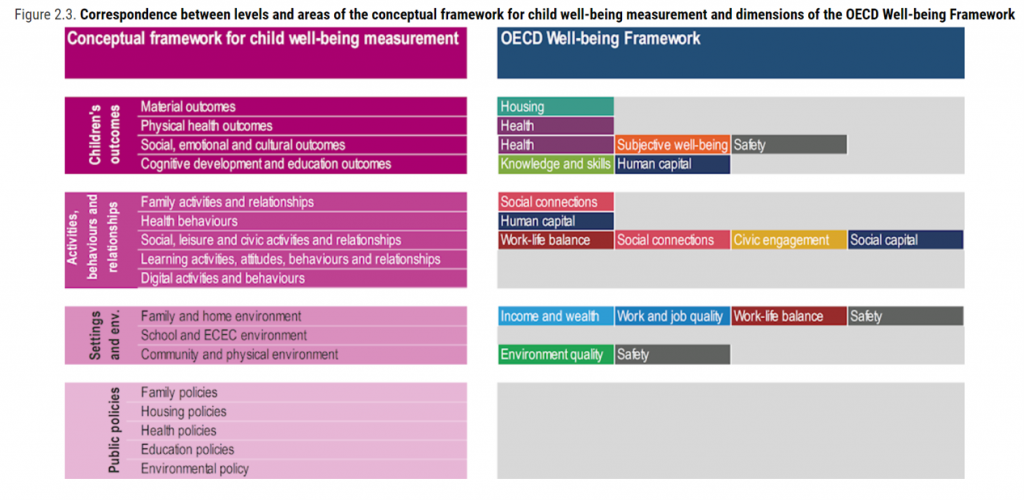The ultimate health and wellbeing of an adult depends on the factors that shape us when we are children.
 A new, deep report from the OECD, Measuring What Matters for Child Well-being and Policies, spells out the many domains of experience that, together, bolster our whole health as we grow from child to adult.
A new, deep report from the OECD, Measuring What Matters for Child Well-being and Policies, spells out the many domains of experience that, together, bolster our whole health as we grow from child to adult.
The first chart presents the OECD’s framework for measuring child well-being, calling out the nature of being “aspirational.”
This re-look at children’s health data is aspirational because it is laying out how to best measure child well-being to set the bar higher for doing so. It addresses a deficit in previous measurements of childhood health which look at individual factors of well-being versus weaving together their inter-relationships.
We now know that social determinants of health travel in groups — that is our ZIP codes make our health more than our genetic codes, and where we live (that ZIP code) translates into our air and water quality, the safety of our neighborhoods, our access to healthy and fair-priced foods, transportation networks, broadband connectivity, and education quality as well as health care coverage, access and equity.
“Well-being needs to be understood as a whole because its dimensions develop alongside one another,” the report asserts.
 What happens to us as children then sets the personal stage for us as adults. The second graphic connects the children’s data framework to adult social determinants of health (housing, social capital, work-life balance, etc.).
What happens to us as children then sets the personal stage for us as adults. The second graphic connects the children’s data framework to adult social determinants of health (housing, social capital, work-life balance, etc.).
When we’re very young, social and public policies have everything to do with setting us up for successful, healthy adulthood — in mind (in terms of cognitive development and educational outcomes), body (in terms of physical health outcomes), spirit (as social and emotional outcomes), and pocketbook (based on our material outcomes).
Health Populi’s Hot Points: Next week is the conference of the Childhood Injury Prevention Convention, which will feature many of these issues — especially related to health equity and under-served populations among which children feature all-too-prominently. [Follow the conference on Twitter using the hashtag #PrevCon2021 and the organizational tag @SafeKids].
Among the four key outcomes OECD identifies downstream, social, emotional and cultural capital have been greatly impacted during the COVID-19 pandemic in the U.S. across racial and ethnic lines. Mental and emotional health impacts will emerge as a long-term epidemic inside and after the pandemic becomes endemic and recedes in 2022 onward.
For the first time in the organization’s 117-year history, Children’s Hospital Colorado has declared a pediatric mental health emergency, discussed here in U.S. News & World Report.
“The tragic reality we are facing is that the top reason kids come to our emergency departments is because they’re having suicidal thoughts. In fact, emergency department visits due to severe anxiety and depression, or feelings of isolation, disconnectedness and hopelessness, are up 72% across the system compared to the same time period in 2019. In addition to increasing diagnoses of anxiety and depression and suicidal thoughts and attempts, we expect to see a rise in substance use and abuse, as well as the inability for students to make meaningful education progress – all of which will have long-term emotional and economic impacts,” Jena Hausmann, CEO of Children’s Hospital Colorado, writes in U.S. News.
Certainly, scores of children missed school, which experts expect will harm kids’ cognitive development now and over time. In recognizing this, we see how the pandemic’s mental health impacts on our kids spills over into the education lags and cognitive impacts on young students, which can then impact other aspects of health and in the long-run, the financial prospects for children as they grow into young adults and eventually workers paying taxes in their communities.
As we try to build-back-better, investing in children would generate a big ROI across many metrics.
And as a sidebar, note that playing with your kids yields all sorts of benefits – mind, body, spirit. For a mainstream view on this, here’s CNN’s take.
And there’s always LEGO, promoting equity for all. Yes: everyone is awesome.
The post The Many Factors That Make a Child’s Well-Being Build Our Adult Health – the Aspirational OECD Framework appeared first on HealthPopuli.com.
The Many Factors That Make a Child’s Well-Being Build Our Adult Health – the Aspirational OECD Framework posted first on https://carilloncitydental.blogspot.com
No comments:
Post a Comment